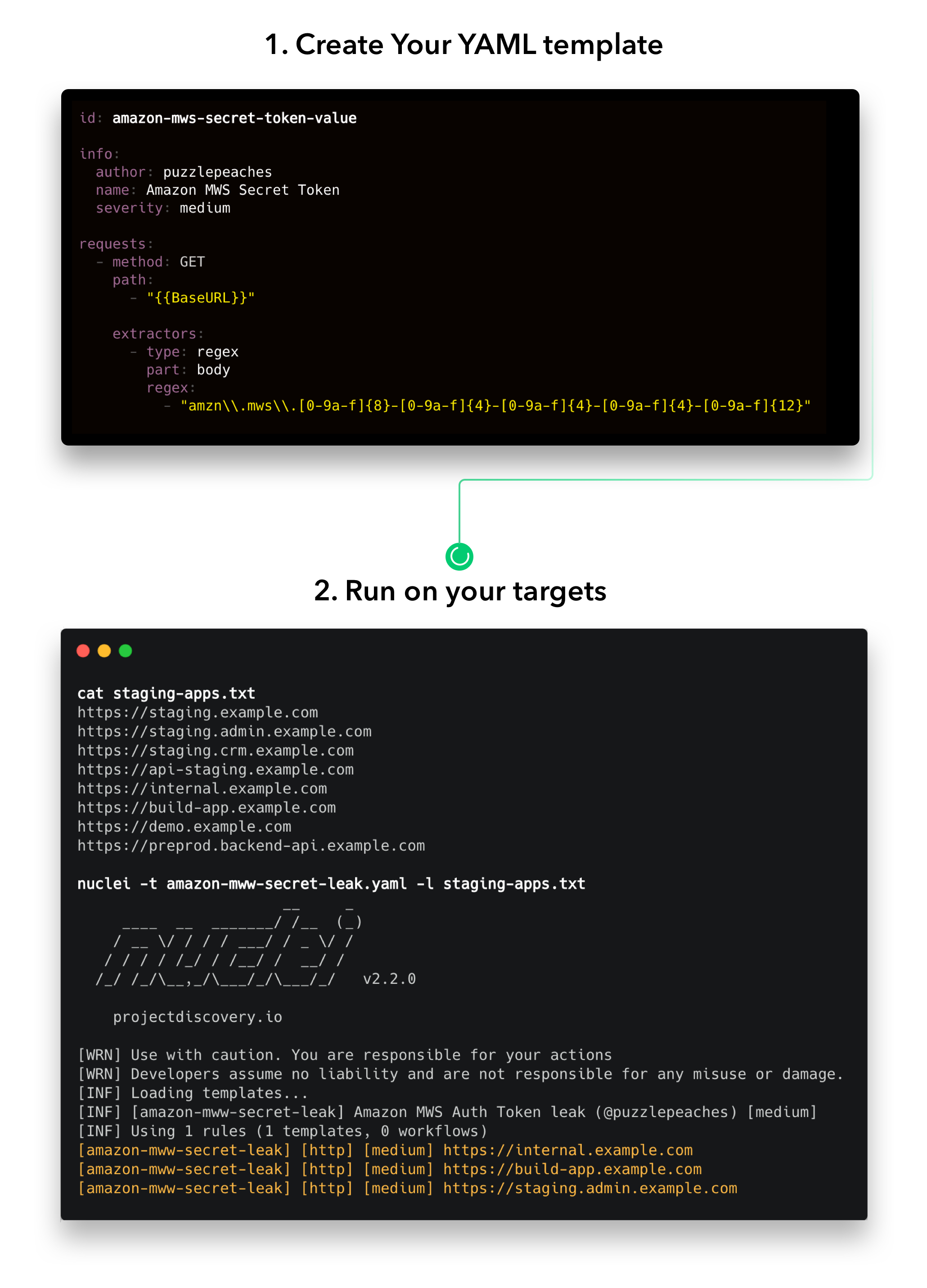How • Install • For Security Engineers • For Developers • Documentation • Credits • FAQs • Join Discord
Nuclei is used to send requests across targets based on a template leading to zero false positives and providing fast scanning on large number of hosts. Nuclei offers scanning for a variety of protocols including TCP, DNS, HTTP, File, etc. With powerful and flexible templating, all kinds of security checks can be modelled with Nuclei.
We have a dedicated repository that houses various type of vulnerability templates contributed by more than 100 security researchers and engineers. It is preloaded with ready to use templates using -update-templates flag.
GO111MODULE=on go get -v github.com/projectdiscovery/nuclei/v2/cmd/nucleiMore installation methods can be found here.
|
Nuclei has had built-in support for automatic update/download templates since version v2.4.0. Nuclei-Templates project provides a community-contributed list of ready-to-use templates that is constantly updated. You may still use the |
nuclei -hThis will display help for the tool. Here are all the switches it supports.
Nuclei is a fast, template based vulnerability scanner focusing
on extensive configurability, massive extensibility and ease of use.
Usage:
./nuclei [flags]
Flags:
TARGET:
-u, -target string target URL/host to scan
-l, -list string path to file containing a list of target URLs/hosts to scan (one per line)
TEMPLATES:
-tl list all available templates
-t, -templates string[] template or template directory paths to include in the scan
-w, -workflows string[] list of workflows to run
-nt, -new-templates run newly added templates only
-validate validate the passed templates to nuclei
FILTERING:
-tags string[] execute a subset of templates that contain the provided tags
-include-tags string[] tags from the default deny list that permit executing more intrusive templates
-etags, -exclude-tags string[] exclude templates with the provided tags
-include-templates string[] templates to be executed even if they are excluded either by default or configuration
-exclude-templates, -exclude string[] template or template directory paths to exclude
-severity, -impact string[] execute templates that match the provided severities only
-author string[] execute templates that are (co-)created by the specified authors
OUTPUT:
-o, -output string output file to write found issues/vulnerabilities
-silent display findings only
-v, -verbose show verbose output
-vv display extra verbose information
-nc, -no-color disable output content coloring (ANSI escape codes)
-json write output in JSONL(ines) format
-irr, -include-rr include request/response pairs in the JSONL output (for findings only)
-nm, -no-meta don't display match metadata
-rdb, -report-db string local nuclei reporting database (always use this to persist report data)
-me, -markdown-export string directory to export results in markdown format
-se, -sarif-export string file to export results in SARIF format
CONFIGURATIONS:
-config string path to the nuclei configuration file
-rc, -report-config string nuclei reporting module configuration file
-H, -header string[] custom headers in header:value format
-r, -resolvers string file containing resolver list for nuclei
-system-resolvers use system DNS resolving as error fallback
-passive enable passive HTTP response processing mode
INTERACTSH:
-no-interactsh do not use interactsh server for blind interaction polling
-interactsh-url string self-hosted Interactsh Server URL (default "https://interact.sh")
-interactions-cache-size int number of requests to keep in the interactions cache (default 5000)
-interactions-eviction int number of seconds to wait before evicting requests from cache (default 60)
-interactions-poll-duration int number of seconds to wait before each interaction poll request (default 5)
-interactions-cooldown-period int extra time for interaction polling before exiting (default 5)
RATE-LIMIT:
-rl, -rate-limit int maximum number of requests to send per second (default 150)
-bs, -bulk-size int maximum number of hosts to be analyzed in parallel per template (default 25)
-c, -concurrency int maximum number of templates to be executed in parallel (default 10)
OPTIMIZATIONS:
-timeout int time to wait in seconds before timeout (default 5)
-retries int number of times to retry a failed request (default 1)
-project use a project folder to avoid sending same request multiple times
-project-path string set a specific project path (default "/var/folders/ml/m31ysb5x73l1s3kjlyn5g4180000gn/T/")
-spm, -stop-at-first-path stop processing HTTP requests after the first match (may break template/workflow logic)
HEADLESS:
-headless enable templates that require headless browser support
-page-timeout int seconds to wait for each page in headless mode (default 20)
-show-browser show the browser on the screen when running templates with headless mode
DEBUG:
-debug show all requests and responses
-debug-req show all sent requests
-debug-resp show all received responses
-proxy, -proxy-url string URL of the HTTP proxy server
-proxy-socks-url string URL of the SOCKS proxy server
-trace-log string file to write sent requests trace log
-version show nuclei version
-tv, -templates-version shows the version of the installed nuclei-templates
UPDATE:
-update update nuclei to the latest released version
-ut, -update-templates update the community templates to latest released version
-ud, -update-directory string overwrite the default nuclei-templates directory (default "$HOME/nuclei-templates")
STATISTICS:
-stats display statistics about the running scan
-stats-json write statistics data to an output file in JSONL(ines) format
-si, -stats-interval int number of seconds to wait between showing a statistics update (default 5)
-metrics expose nuclei metrics on a port
-metrics-port int port to expose nuclei metrics on (default 9092)Scanning target domain with community-curated nuclei templates.
nuclei -u https://example.comScanning target URLs with community-curated nuclei templates.
nuclei -list urls.txtExample of urls.txt:
http://example.com
http://app.example.com
http://test.example.com
http://uat.example.comMore detailed examples of running nuclei can be found here.
Nuclei offers great number of features that are helpful for security engineers to customise workflow in their organisation. With the varieties of scan capabilities (like DNS, HTTP, TCP), security engineers can easily create their suite of custom checks with Nuclei.
- Varieties of protocols supported: TCP, DNS, HTTP, File, etc
- Achieve complex vulnerability steps with workflows and dynamic requests.
- Easy to integrate into CI/CD, designed to be easily integrated into regression cycle to actively check the fix and re-appearance of vulnerability.
|
For bugbounty hunters: Nuclei allows you to customise your testing approach with your own suite of checks and easily run across your bug bounty programs. Moreover, Nuclei can be easily integrated into any continuous scanning workflow.
Please check our other open-source projects that might fit into your bug bounty workflow: github.com/projectdiscovery, we also host daily refresh of DNS data at Chaos. |
|
For pentesters: Nuclei immensely improve how you approach security assessment by augmenting the manual repetitve processes. Consultancies are already converting their manual assessment steps with Nuclei, it allows them to run set of their custom assessment approach across thousands of hosts in an automated manner. Pen-testers get the full power of our public templates and customization capabilities to speed-up their assessment process, and specifically with the regression cycle where you can easily verify the fix. |
Nuclei is built with simplicity in mind, with the community backed templates by hundreds of security researchers, it allows you to stay updated with latest security threats using continuous Nuclei scanning on the hosts. It is designed to be easily integrated into regression tests cycle, to verify the fixes and eliminate vulnerabilities from occuring in future.
- CI/CD: Engineers are already utilising Nuclei within their CI/CD pipeline, it allows them to constantly monitor their staging and production environments with customised templates.
- Continuous Regression Cycle: With Nuclei, you can create your custom template on every new identified vulnerability and put into Nuclei engine to eliminate in the continuous regression cycle.
We have a discussion thread around this, there are already some bug bounty programs giving incentives to hackers on writing nuclei templates with every submission, that helps them to eliminate the vulnerability across all their assets, as well as to eliminate future risk in reappearing on productions. If you're interested in implementing it in your organisation, feel free to reach out to us. We will be more than happy to help you in the getting started process, or you can also post into the discussion thread for any help.
- Community Powered Scanning with Nuclei
- Nuclei Unleashed - Quickly write complex exploits
- Nuclei - Fuzz all the things
- Nuclei + Interactsh Integration for Automating OOB Testing
- Weaponizes nuclei Workflows to Pwn All the Things by @dwisiswant0
- How to Scan Continuously with Nuclei? by @dwisiswant0
- Hack with Automation !!! by @DhiyaneshGeek
Thanks to all the amazing community contributors for sending PRs. Do also check out the below similar open-source projects that may fit in your workflow:
FFuF, Qsfuzz, Inception, Snallygaster, Gofingerprint, Sn1per, Google tsunami, Jaeles, ChopChop
Nuclei is distributed under MIT License









